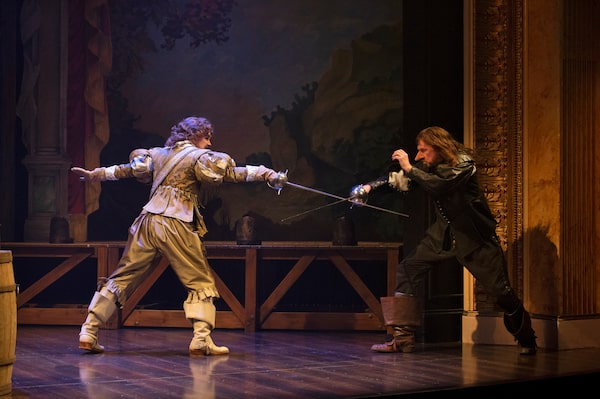
Deborah Hay as Roxane and Tom Rooney as Cyrano in Cyrano de Bergerac.Handout
Keep up to date with the weekly Nestruck on Theatre newsletter. Sign up today.
- Title: Cyrano de Bergerac
- Written by: Edmond Rostand
- Translated and adapted by: Kate Hennig
- Directed by: Chris Abraham
- Actors: Tom Rooney, Deborah Hay, Jeff Irving
- Company: The Shaw Festival
- Venue: Royal George Theatre in Niagara-on-the-Lake, Ont.
- COVID-19 measures: Masks and proof of vaccination required
- Year: Runs to May 8, 2022
Critic’s Pick
Cyrano de Bergerac is back and more achingly romantic than ever at the Shaw Festival.
Has the big-hearted, bigger-nosed swashbuckler changed since he was last on stage there in 2019? Or have we been altered by the pandemic – and now have a greater understanding of how it feels to believe, like Cyrano, that we must stay at a distance from those we love to protect them and ourselves?
The same trio of lead performers have returned for this remount of director Chris Abraham’s production, reprised as an appetizer for the Niagara-on-the-Lake, Ont. theatre company’s 60th repertory season. But all three sides of the love triangle they form are even more sharply rendered than before.
Tom Rooney, fan favourite of the Southern-Ontario theatre festival circuit, again plays the title character, who has endless facility with swords and words but lacks self-confidence in love due to his prodigious proboscis.
Rooney is known as one of the funniest classical actors in the country, able to get belly laughs out of the most dated double entendre in Shakespeare.
Cyrano allows him to show a different side; he’s a clever character, but often arrogant in an off-putting manner. He uses his wit more as shield than a rapier – and when he does finally drop it, he is quiveringly vulnerable on stage. The raw romance of Rooney’s performance elicits more sighs than snickers.

My heart swashed; my knees buckled; I soaked my mask with tears.Handout
Deborah Hay is back as his cousin Roxane, the object of Cyrano’s affection (hey, it’s the 17th century). The moment she admits to him that she only has eyes for a young cadet named Christian is when this show lands its first emotional punch.
Her own poignant depiction of pining is a mirror of Cyrano’s, except it is a violent patriarchy rather than an unattractive nose that prevents her from speaking freely in this society; Hay’s guardedness helps keep the play into proper perspective.
Jeff Irving, meanwhile, has deepened into the role of Christian, the handsome but tongue-tied young man who Cyrano decides to help woo Roxane by passing him poetry. Irving never makes him seem like a lunkhead, and, in some ways, ends up the most sadly sympathetic of the central characters as the awareness gradually dawns on him that he is a third wheel in his own love affair.
There are five, swiftly-moving acts in Edmond Rostand’s 1897 play (set in France two and a half centuries earlier, in the same era as The Three Musketeers) – and it takes one and a half for Abraham’s production to really find its panache.
This is partly due to the translation/adaptation by Canadian playwright Kate Hennig in which she has chosen to turn a verse play into a prose play in order to stay as close as possible to Rostand’s original wording. You can feel the absence of the rhymes and the rhythms early on; they are less buoyant.
There’s also the fact that Hennig’s version is designed to be playable by 14 actors – seven men and seven women – instead of 40. The spectacle of the opening scene, especially the famous sword-fight in which Cyrano composes a ballad while duelling, feels shrunken and then squished onto the small stage of the Royal George Theatre in Julie Fox’s design (which later opens up expressionistically).
But Hennig’s approach pays off and any early stumbles completely fade from memory by the time the second-most famous balcony scene in the history of theatre hits the stage.

There are five, swiftly-moving acts in Edmond Rostand’s Cyrano de Bergerac, and it takes one and a half for Chris Abraham’s production to really find its panache..Handout
This is the part of the play where Roxanne demands that Christian speak to her extemporaneously about his passion in her garden. Cyrano feeds him lines of love from the sidelines, but then finally slips beneath the balcony to speak them directly from his heart for the first time.
In the ensuring lush dialogue, Rooney and Hay’s hearts seem to beat together perfectly in sync as their characters make love in old-fashioned sense while socially distanced. They each hold onto one end of a jasmine plant that creeps up the side of Roxane’s house – and their shivers of passion ripple up and down it.
My heart swashed; my knees buckled; I soaked my mask with tears. Thankfully, there was an intermission this scene so I could put on a fresh one and get ready for the rest.
Keep up to date with the weekly Nestruck on Theatre newsletter. Sign up today.
 J. Kelly Nestruck
J. Kelly Nestruck